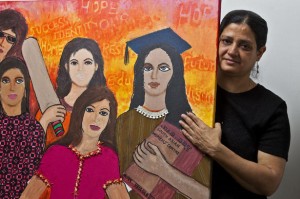Settlement agencies shocked by gag order
Nicholas Keung, Toronto Star, January 17 2011
Immigrant service agencies were horrified when they got a government email last week banning them from discussing recent federal funding cuts that may kill some of them — a memo Citizenship and Immigration Canada now says was all a big mistake.
Members of the York South-Weston Local Immigration Partnership (LIP), which coordinates newcomer programs to reduce duplication of services, had planned to discuss the $53 million funding cuts at its Jan. 13 meeting.
The 26 member organizations were shocked to receive a mass email from a CIC official ordering them to remove the topic from the agenda.
“I don’t believe that CIC settlement funding is a topic for the . . . meeting and therefore it should not be an agenda item,†said the note from federal settlement officer Nina Serrano.
“I was in total shock,†Community Action Resource Centre executive director Marion Newrick said of the ministry order. “They thought they had the right to silence us. We are all community volunteers. CIC doesn’t even cover our time to go to these meetings.â€
The group reluctantly complied. Even so, it was asked to forward the minutes of the meeting to the department the next day.
Some agency representatives are calling the email an example of bullying tactics by Ottawa to prevent any community organizing against the cuts, and to hamper attempts to coordinate services to fill the gaps left by closed programs. The meeting was supposed to provide a fuller picture of the extent of the cuts and their implication for services.
But in response to questions from the Star, Citizenship and Immigration Canada said Monday the email was sent “by mistake,†with incorrect information, and there was no such government directive.
“We recognize that this is a timely and important issue,†department spokesperson Tracie LeBlanc told the Star.
Newrick’s agency is in a neighbourhood among the hardest hit by the federal cuts, in west Toronto along the Davenport-Dupont-St. Clair residential corridor — an area with a growing newcomer population.
Clients at five local agencies slated to close their programs by April are anxious about where they will go for help in the future.
Ruby Banerji said the South Asian Women’s Centre not only helped reunite her with her two sons, but has given her a new life in Canada.
“I was shocked and I am sad by the news,†said Banerji, whose husband died of a heart attack, leaving their two teenage sons here without a parent, as her application to immigrate to Canada from India was still in process.
“The staff here helped me get my boys back and apply to stay in Canada,†added Banerji, who arrived in 2005 and works two jobs to support her children. “They gave me my life and always stand up for me. They are my family.â€
So far, 14 Toronto settlement agencies have been told they will lose funding from Ottawa this year, part of $43 million in cuts in Ontario alone. Surviving organizations will lose some 15 to 40 per cent of their funding.
“We don’t just deliver services to our community; we also do a lot of advocacy work organizing the community,†said Kibrom Debru, part-time executive director of the Eritrean Canadian Community Centre, which faces the loss of $288,000, or 70 per cent of its annual funding. “The voice of the community will disappear.â€
As other agencies in the neighbourhood brace for similar cuts, community leaders fear they won’t be able to fill the vacuum.
“We need to bring everyone around the table to help immigrants who find their services cut or reduced,†said Bill Sinclair, who heads the LIP. “There is still a lot of information on service changes that we don’t have yet. This is a big task for the coming months.â€
An area in need
• Of 30,000 immigrants in the West Downtown Toronto area, one in six is a recent arrival
• 7% of the area’s residents and 11% of recent immigrants can’t speak English
• 80% of recent immigrants are identified as visible minority, with unemployment at 11% compared with 7% for average area residents
• 9% of visible minority immigrants in the area say they have experienced racial discrimination in housing
Source: West Downtown Toronto Local Immigration Partnership Research
Agencies axed in west-end Toronto
• Bloor Information and Life Skills Centre
• Community Action Resource Centre
• Davenport-Perth Neighbourhood Community Centre
• Eritrean Canadian Community Centre
• South Asian Women’s Centre




